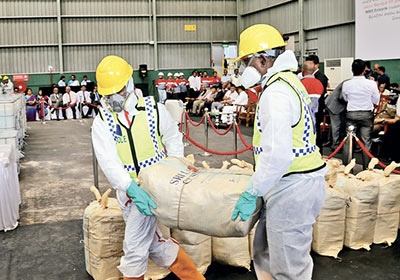Sri Lanka, drug alert: from 'pearl of Asia' to drug trafficking crossroads
The denunciation by opposition MP Eran Wickramaratne of the Sjb. The large quantities coming from India are a cause for concern. A significant part of the smuggled heroin allegedly comes from the so-called 'Golden Triangle' region in South-East Asia. The ruling class accused of ignoring the emergency (also) because of the involvement of local politicians.
Colombo (AsiaNews) - Sri Lanka, once known as "the pearl of Asia", has become the crossroads of drug trafficking in the sub-continent. The accusation was made by Eran Wickramaratne, deputy of the opposition party Samagi Jana Balawegaya (SJB), the most important on the island, during a parliamentary debate on the rules contained in the Ordinance on Poisons, Opium and Dangerous Drugs. The session dates back to April 22nd, but has had wide resonance in recent days, triggering a strong political controversy in the country.
A long-standing and controversial issue, because already in 2005 a UN report on southern Asia indicated Sri Lanka as a landing and transshipment point for heroin coming from India and other areas of the south of the continent to then be sent to the market global.
Furthermore, of particular concern is the introduction of large quantities of heroin from India to the island for local consumption, which would also involve some powerful leading politicians, making the fight against drug trafficking more difficult.
Final destination and crossroads: a double emergency that affects the health of citizens and looms threateningly over the future of the country.
In denouncing the drug problem in Sri Lanka, MP Eran recalled his visit to the Weerawila Open Prison last month, underlining that the majority of the 450 inmates are in cells for drug offences. The prison director called for decisive interventions by the legislator and the police force to "stop drug smuggling into the country" because the remaining part, produced internally, "could easily be eradicated".
Words that sound like an indictment against the political class, previously responsible for the spread of drugs, and which is responsible for finding solutions to stem a phenomenon whose scale has now become worrying. In this regard, the SJB parliamentarian is convinced that "if politicians assume their responsibilities" traffic can be stopped, but we tend to think that "the problems are elsewhere".
During the debate Wickramaratne also drew attention to the issues raised during Patali MP Champika Ranawaka's visit to Welikada Prison last week. At the end of the inspection, he reported that there are currently around 5 thousand inmates for drug crimes, when the prison can only accommodate 800.
According to senior police officials, investigators have identified five Europe-based traffickers believed to be the masterminds behind large-scale drug smuggling. The suspects are Sri Lankan citizens operating from various European nations, including France, as a base. Of course, most of the drug trafficking bosses reside in the Middle East, but the police have identified these five internal "key players" as responsible for the majority of drug distribution.
Traffickers use various methods for smuggling by sea, using boats flying foreign flags which then deliver the goods to local fishing boats, especially those that remain offshore for several days.
Furthermore, a significant portion of the smuggled heroin comes from the so-called “Golden Triangle” region in Southeast Asia, which includes parts of Thailand, Myanmar and Laos. Drugs are also transported to Sri Lanka from Afghanistan via the sea routes of Pakistan and Iran. Boats loaded with drugs deliver their cargo on the open sea to fishing boats, which then transfer it to the mainland.
The seizures of local and foreign fishing boats loaded with drugs have led to the belief that Sri Lanka is becoming a crossroads for drug trafficking. According to Public Security Minister Tiran Alles, “identifying these foreign-based traffickers, arresting them through foreign judiciaries and extraditing them to Sri Lanka is a very laborious process.” In the past, he concludes, foreign courts have ruled against the extradition of suspects arrested on the island and so far the attempts at mediation or seeking an agreement promoted by the government have been of little avail.







.png)










